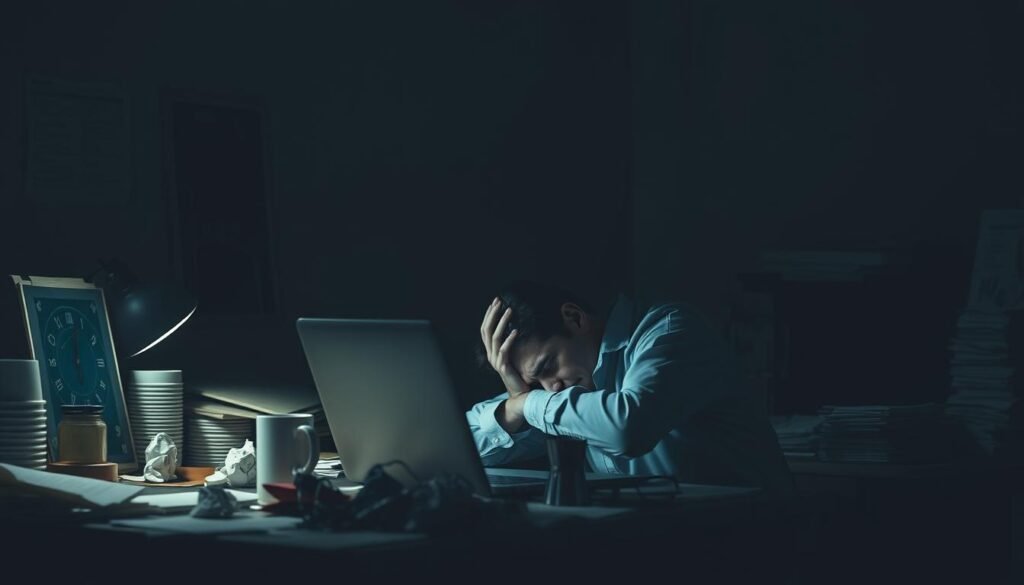Did you know a restless night could cost your job billions? Studies reveal a clear connection between insomnia and work performance. In the US, around 70 million people deal with sleep issues like insomnia. This affects job performance greatly. The America Insomnia Survey found about 23.2% of workers have insomnia.
This problem leads to an economic loss of $15 to $92 billion each year. Employers must realize the importance of sleep for a productive team. For more details on how lack of sleep costs money, check this analysis.
Key Takeaways
- Approximately 70 million Americans are affected by untreated sleep disorders.
- 35% of U.S. adults do not achieve the recommended amount of sleep.
- Nearly half of all workers believe their mood is significantly influenced by sleep quality.
- Sleep-deprived employees are at higher risk for workplace accidents.
- Poor sleep can lead to economic losses due to increased absenteeism.
- Companies are beginning to recognize the importance of sleep programs for employees.
Understanding Insomnia
Insomnia includes trouble falling asleep, staying asleep, or getting deep sleep. About one in three working U.S. adults suffer from it. This makes it a major health problem. There are different kinds of insomnia: transient, short-term, and chronic. They vary in how long they last. Healthcare professionals use specific guides to diagnose these sleep issues.
Insomnia hurts more than just the person who can’t sleep. It affects work performance and mental health. People with insomnia cause big losses at work. The cost to employers is over $90 billion a year due to lower productivity and accidents. Insomnia is tied to more sick days, too. About 13 percent of workers with sleep problems often miss work. This is nearly double the rate of those with no sleep problems.
Ignoring insomnia can lead to higher healthcare costs, reaching $44 billion annually. It’s key to understand and tackle insomnia. Doing so can improve work performance, employee health, and mental state. Millions could benefit from better sleep practices.
Prevalence of Insomnia in the Workforce
Insomnia is a big problem for workers in the U.S. About one-third of adults don’t sleep well weekly. The American Insomnia Survey found that 50–70 million people are affected. This issue touches their work and life. Industries see a 4.6% rate of moderate insomnia, with arts and sports being hit hardest.
Women, especially those over 60, often struggle more with sleeplessness. Smaller companies see more insomnia than big ones. This shows that not sleeping well is a problem that bosses need to fix. Employers should notice and help.
Jobs like manufacturing and health care have lots of night shifts. This makes sleep problems worse. For instance, in Australia, 22% of 22-year-olds have sleep troubles. Those with insomnia lose about 164 hours of work each year. This is way more than the 30 hours lost by those who sleep well.
Insomnia really affects how well a company does. Being at work but not fully able to work does more harm than being absent. It’s crucial to find solutions that make workers feel better. Knowing who has trouble sleeping can start fixing this big problem.
How Insomnia Affects Work Productivity
Sleep loss greatly affects job performance and has a big impact on businesses. The tie between not sleeping enough and lower work productivity is clear. It leads to big losses. This shows why we must deal with insomnia at work.
Link Between Sleep Deprivation and Job Performance
Studies show that people with serious insomnia lose over 107 percent in productivity. Those with mild insomnia lose about 58 percent. This shows how key good sleep is for good work. People who feel sleepy during the day lose 50 percent more in productivity. It affects their concentration and thinking. People who snore, often having sleep apnea, also see a 19-34 percent drop in productivity.
Economic Cost of Impaired Work Productivity
The economic loss from sleep deprivation is huge. A study from the SHADES project looked at 1,007 adults. They used the Well-being Assessment of Productivity tool. The study found that less sleep equals more lost productivity. People who sleep 7 to 8 hours lose less productivity than those who sleep under 5 hours. The loss here is 29 percent more. This shows firms need to help workers sleep better. Doing things like encouraging a regular sleep schedule can make workers more efficient. This helps the company’s bottom line too.

Cognitive Impairment and Sleep Deprivation
Sleep deprivation affects our ability to think well. It hits memory and learning the hardest. If we don’t get enough sleep, our bodies struggle to keep memories. This makes learning new things at work tough.
Employees with focus issues find it hard to pay attention and finish tasks. This can lead to worse job performance. Over time, not sleeping enough harms our brain’s long-term health, too.
Impact on Memory and Learning
Our brains need sleep to store memories, especially during deep sleep phases. But, poor sleep messes with this process. This can make us less sharp at work.
Research shows that not sleeping enough lowers how well we think and work. Bad sleep cuts down our attention, problem-solving skills, and emotional control. This makes learning new things harder for employees.
Concentration Issues Faced by Employees
Not sleeping well often leads to trouble focusing at work. Employees may feel overly tired, make poor decisions, and adapt less easily. These issues stem from changes in brain chemicals, worsened by not sleeping enough.
This makes it tough to stay focused and alert. And, it ends up affecting job performance and chances for moving up in their careers.

| Effects of Sleep Deprivation | Impact on Cognitive Function |
|---|---|
| Shortened sleep duration | Reduced memory consolidation |
| Fragmented sleep | Impaired attention span |
| Increased daytime sleepiness | Diminished problem-solving skills |
| Emotional dysregulation | Compromised creativity |
| Long-term cognitive decline | Increased risk of dementia |
Physical Health Consequences
Physical health and insomnia go hand in hand, affecting our ability to work well. Lack of sleep leads to fatigue, making it hard for employees to perform their best. About 35% of Americans don’t get enough sleep, leading to a workplace where tiredness and safety are big problems. This sleep shortage affects our thinking, slows our reactions, and makes coordination hard.
Fatigue and Its Effects on Work Performance
Fatigue creates a cycle that hurts job performance. Workers who don’t get enough sleep find it hard to focus, increasing mistakes. Studies show that sleepy workers have a 70% higher chance of accidents at work than those who are well-rested. The cost of sleep deprivation was between $280 and $411 billion in 2015. It shows how important it is to solve sleep problems for better health.
Increased Risk of Workplace Accidents
Insomnia makes workplace safety a big issue for American workers. Changing work hours or traveling through time zones can mess up our natural sleep patterns. This leads to feeling more tired at work, putting safety at risk. Studies found that 1.23 million workdays are lost each year because of not sleeping enough. This highlights the need for better sleep habits.

Mood Disturbances Linked to Lack of Sleep
Mood disturbances hit hard when you don’t sleep enough. This affects your emotions and how you work with others. Many people feel more irritable, anxious, and up and down emotionally. It’s tough for them to handle sleep trouble and stress. This makes working together harder.
Emotional Responses and Stress Management
Not sleeping enough makes you feel all over the place emotionally. Studies show it’s linked to more anxiety, which makes work stressful. Not being emotionally healthy makes it hard to do your job. Getting help and joining programs at work to manage stress can help a lot.
Relationship Between Insomnia and Employee Well-being
Insomnia is a big problem for workers’ health. About one-third of Americans don’t get the seven hours of sleep they need. One out of three adults has signs of insomnia, and 20% have an insomnia disorder. These numbers have gone up a lot since the pandemic. More people are facing mood problems, anxiety, and depression.
Jobs that support emotional health and good sleep can see better work and happy teams. Recognizing how sleep and emotions are connected helps make a better workplace.
| Impact of Sleep Deprivation | Percentage of Affected Individuals |
|---|---|
| Individuals experiencing mood disturbances | Over 56% |
| Workers reporting fatigue at work | 38% |
| Adults with clinical insomnia symptoms | 33% |
| Adults meeting criteria for insomnia disorder | 20% |
Presenteeism Versus Absenteeism
It’s essential to know the difference between presenteeism and absenteeism in the workplace. Presenteeism means workers are there but not fully productive, often due to health issues. On the other side, absenteeism is when workers miss work completely. While it’s easy to spot absenteeism, presenteeism is harder to notice but can lead to a lot of lost productivity.
Understanding the Difference in Context
Insomnia is a key factor that affects both presenteeism and absenteeism. Studies show that people with insomnia are more likely to face problems with both being present and staying away from work. This is shown by odds ratios of 3.48 for absenteeism and 3.68 for presenteeism. As symptoms of insomnia get worse, as shown by the Minimal Insomnia Symptoms Scale (MISS), both absenteeism and presenteeism tend to increase.
Data on Work Performance Loss Due to Presenteeism
Starting insights show how insomnia leads to lost productivity. With 18% of workers facing insomnia, the impact on work efficiency is huge. Insomnia is linked to a higher chance of presenteeism, affecting work output no matter how much physical activity a worker does. Specifically, those with insomnia are 40% more likely to experience presenteeism.
For workers not active physically and struggling with insomnia, absenteeism jumps by 28%. This means on average, they take one more sick day a year than those who are active. Understanding this data highlights why tackling insomnia is critical for workplace productivity. Insomnia significantly affects how much work is done and can deeply impact both the business and the health of employees.
| Insomnia Condition | Odds of Presenteeism | Odds of Absenteeism |
|---|---|---|
| No Insomnia | Base Level | Base Level |
| Insomnia Present | 3.68 | 3.48 |
| Physically Inactive with Insomnia | Increase by 40% | Increase by 28% |
| Physically Active without Insomnia | Base Level | Base Level |
Strategies for Managing Insomnia in the Workplace
It’s really important to handle insomnia at work to keep up productivity and well-being. Good sleep strategies at work can really boost health and performance for everyone. By helping employees sleep better, companies make a big positive change.
Interventions and Employee Assistance Programs
Companies can set up programs to help workers who struggle with insomnia. Many studies have looked at how work interventions can make sleep better. Programs that teach about good sleep habits are really helpful.
By working with sleep experts, companies can offer even better support. These partnerships can provide care and new solutions like SleepioRx for insomnia. Such steps improve health and cut down on lost productivity, which costs a lot each year.
Promoting Healthy Sleep Habits at Work
Healthy sleep habits at work can really improve how well employees do their jobs. Letting workers choose their hours can make them more satisfied and less tired. Taking short naps at work can also help a lot with staying sharp and less stressed.
The table below illustrates key interventions and their potential impacts on sleep health within organizations:
| Intervention | Impact |
|---|---|
| Employee Assistance Programs | Provide resources for workers facing insomnia, fostering support and guidance. |
| Educational Workshops | Enhance awareness regarding sleep hygiene and fatigue management. |
| Flexible Work Hours | Accommodate individual sleep preferences, boosting productivity. |
| Access to Sleep Specialists | Facilitate interventions like cognitive behavioral therapy to reduce insomnia symptoms. |
| Short Nap Policies | Improve alertness, focus, and memory, contributing to better work performance. |
Using these sleep strategies in the workplace helps employees beat insomnia. It also makes work more enjoyable and productive. Recognizing how important sleep is to doing well at work and valuing rest brings big benefits. To learn more about the effects of not treating insomnia at work, check out the findings here.
Case Studies of Insomnia Impact on Work Productivity
Many insomnia case studies show sleep loss hurts work across many jobs. Healthcare and transportation workers suffer because their shifts mess up sleep. These stories from various fields show why bosses must fix sleep issues to improve work.
Real-world Examples from Different Industries
Looking at workplaces, it’s clear insomnia harms more than just one person. Workers sleeping under seven hours often struggle to stay focused, finish tasks on time, and be creative. Solving insomnia could save industries $63.2 billion a year, showing the big need for action.
Analysis of Insomnia Management Programs
Companies are now fighting insomnia with new programs for their teams. They’re rolling out wellness programs for better sleep and specific actions for certain jobs. By helping staff sleep better, companies gain more productivity and reduce lost workdays. This moves towards improving staff’s lives and work success.